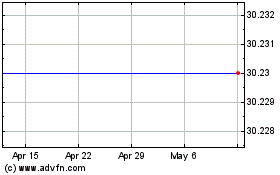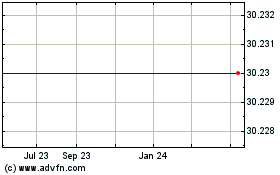Credit Suisse, Barclays to Settle 'Dark Pool' Investigations -- 2nd Update
January 31 2016 - 1:23PM
Dow Jones News
By Bradley Hope and Jenny Strasburg
Credit Suisse Group AG and Barclays PLC are set to agree to pay
about $150 million combined to settle investigations by regulators
into their "dark pools," according to people familiar with the
matter.
The record settlements are with the Securities and Exchange
Commission and New York Attorney General. An announcement is
expected as early as Monday, the people said.
Representatives of the SEC, Barclays and Credit Suisse declined
to comment. The Attorney General's office didn't respond
immediately.
The agreements will immediately become the biggest and
second-biggest settlements related to dark pools, which are
privately run stock-trading venues that have come under greater
scrutiny in the past several years. Regulators and other critics
have accused dark pools of providing unfair advantages to
professional traders at the expense of big institutions.
The biggest settlement thus far is the $20.3 million New York
brokerage Investment Technology Group Inc. agreed to pay the SEC in
August. ITG admitted wrongdoing in its case.
Under the planned settlement, Credit Suisse will pay a total of
about $85 million--$30 million to each the SEC and New York
Attorney General and $24.3 million in disgorged profits, the people
said.
Barclays is expected to pay about $70 million to settle charges
that include those brought in a high-profile fraud case by the New
York Attorney General against Barclays in connection with its dark
pools in June 2014. In that case, the New York Attorney General
alleged Barclays misled clients about the extent of high-frequency
trading in its dark pool, called LX.
Both cases center in part on whether the banks misled some
clients about how the bank-owned trading venues prioritized certain
buy and sell orders, including whether they withheld information
that might have led clients to route orders elsewhere, people
familiar with the probes said.
Wall Street firms have competed fiercely for market share in
stock trading, which generates fees and helps banks garner
information about the markets and sell other products to
clients.
Issues of disclosure and whether shares were priced according to
stock-market regulations factored into the regulators'
investigations, the people said.
Dark pools originally were created to help buyers and sellers
swap shares with greater anonymity--and sometimes in greater
size--than they could on the stock market. They also help banks cut
costs because they don't have to pay fees to stock exchanges when
trades are executed in their own dark pools.
Aruna Viswanatha and Christopher M. Matthews contributed to this
article.
Write to Bradley Hope at bradley.hope@wsj.com and Jenny
Strasburg at jenny.strasburg@wsj.com
(END) Dow Jones Newswires
January 31, 2016 13:08 ET (18:08 GMT)
Copyright (c) 2016 Dow Jones & Company, Inc.
Investment Technology (NYSE:ITG)
Historical Stock Chart
From Oct 2024 to Nov 2024

Investment Technology (NYSE:ITG)
Historical Stock Chart
From Nov 2023 to Nov 2024
